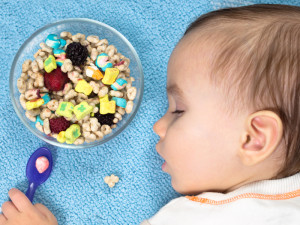Could What I'm Feeding My Toddler be Keeping them Awake?
/ Could What I’m Feeding my Toddler be Keeping them Awake?
I'm often asked by parents about what foods are best at bedtime. And, if there's anything they shouldn't feed their kids before bed. There’s a lot of old wives tales and urban myths about foods and food ingredients either helping or hindering sleep, thus keeping toddlers awake. However, there isn’t strong evidence connecting specific foods and sleep –either preventing sleep or causing kids to fall asleep (and stay asleep).
Could What I’m Feeding my Toddler be Keeping them Awake?
I'm often asked by parents about what foods are best at bedtime. And, if there's anything they shouldn't feed their kids before bed. There’s a lot of old wives tales and urban myths about foods and food ingredients either helping or hindering sleep, thus keeping toddlers awake. However, there isn’t strong evidence connecting specific foods and sleep –either preventing sleep or causing kids to fall asleep (and stay asleep).
Here’s a roundup of the most common foods that we hear are connected with sleep.
A Glass of Warm Milk
A glass of warm milk is a classic trick to help kids fall asleep. However, it’s unlikely that it’s the milk itself that makes kids sleepy. What’s more likely is that it’s the routine that gets kids ready for sleep. Kids thrive with routines. It signals to them what’s about to happen next in their world and it tells them what’s expected from them. This includes bedtime routine.
If you choose to have a bedtime snack, have a bedtime snack every day. Serve your child’s bedtime snack in the same place every day (I recommend sitting at the table). Join your child while he/she’s eating and have a conversation. Don’t talk (negotiate) about having two more bites. Instead enjoy the opportunity to connect, perhaps telling stories, talking about your day, etc. Then brush teeth and continue with the rest of the bedtime routine.
Sitting to eat together is an opportunity to connect with each other and wind down from the day. It’s a fantastic way to get kids prepared for falling asleep.
Sugar
Interestingly, when it’s tested in scientific studies, sugar doesn’t cause kids to be more active. Yet, countless parents can tell you that sugar makes their kids “hyper”. If your little one is having difficulty falling asleep, try keeping sugary treats as occasional daytime foods (as opposed to evening foods) and see if it has an effect on your little ones’ sleep.
Artificial Colours
There is mixed evidence in scientific studies about the effect of artificial colours and the preservative sodium benzoate on kids’ behaviour. Some studies have found that there is no effect on kids’ behavior. Other studies have found that some kids don’t react to these foods but some kids do react. The way to find out if your child is a member of the group of kids who may react, is to eliminate all foods with these additives from your child’s diet for a period of time and see if there’s a change in her/his behavior. Label reading for these foods can be challenging. So, if you’re thinking of testing your child’s reaction to an elimination diet, I recommend working with a dietitian to make sure that you’re catching all food sources and still making sure that your child’s getting all the nutrition that she/he needs.
Food Negotiations
Waking up hungry in the middle of the night can be a side-effect of battling at mealtimes with toddlers who are picky eaters. No-one loves a negotiation like a toddler! Unfortunately, they can enjoy winning the battle so much that they ignore their feelings of hunger resulting in waking up in the middle of the night because they’re hungry.
While it feels awful to hear a child tell you that they’re hungry, resist feeding them a snack in the middle of the night. Feeding snacks in the night rewards kids for not eating at mealtimes. Also, it role models eating snacks in the middle of the night (which we don’t want to encourage). Instead, focus on removing the battles at daytime meals and snacks. How to remove the battles? Well, that’s what I share with you here at my blog. Sign-up to never again miss a toddler nutrition tip (or recipe).


